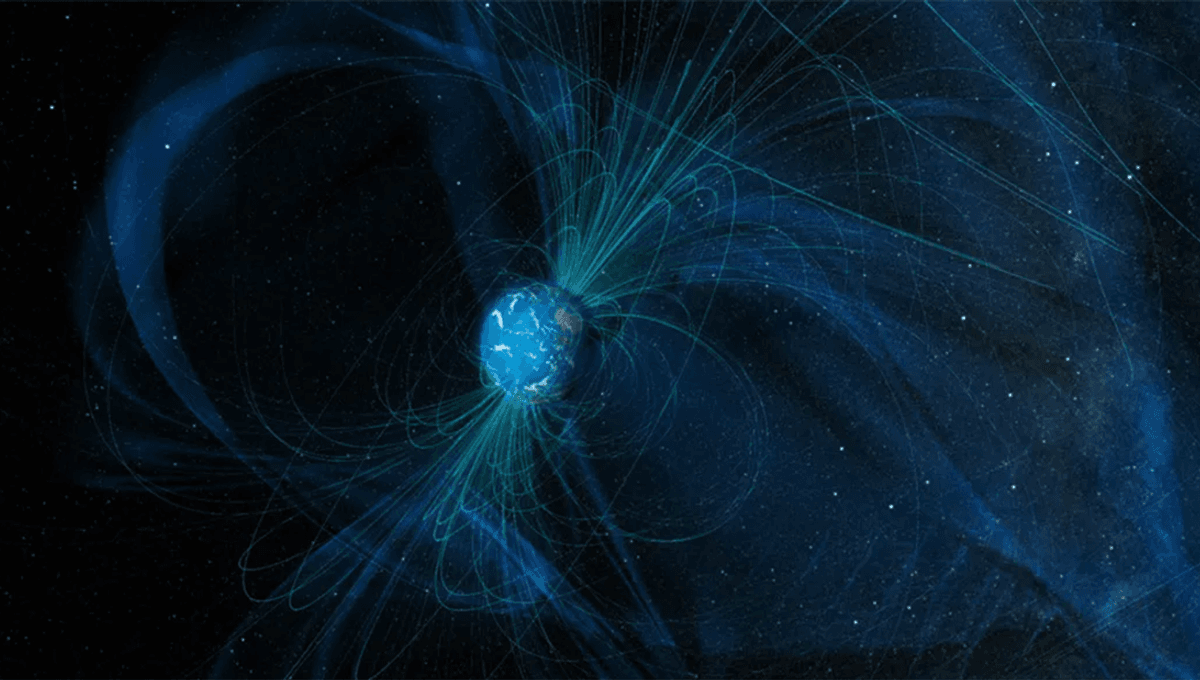
An animation using data from the European Space Agency (ESA) allows you to listen to a “sounded visualization” of Earth’s magnetic field being disrupted during the Laschamp event.
You probably don’t worry about the Earth’s magnetic fields too much, assuming you don’t have to rely on a compass for navigation. The magnetosphere generally sits up there minding its own business, protecting the Earth’s surface from charged particles from the Sun, and occasionally producing spectacular aurora. But the Earth’s magnetic fields are not as fixed as you might think.
“We know that over the past 200 years, the magnetic field has weakened about 9 percent on a global average. However, paleomagnetic studies show the field is actually about the strongest it’s been in the past 100,000 years, and is twice as intense as its million-year average,” NASA explains.
“Since it was first precisely located by British Royal Navy officer and polar explorer Sir James Clark Ross in 1831, the magnetic north pole’s position has gradually drifted north-northwest by more than 600 miles (1,100 kilometers), and its forward speed has increased, from about 10 miles (16 kilometers) per year to about 34 miles (55 kilometers) per year.”
The poles can flip over the course of hundreds or thousands of years, and this can happen at random, with intervals ranging anywhere from 10,000 years to 50 million years or more.
The last true sustained reversal of the magnetic poles happened around 780,000 years ago – but more recently, around 41,000 years ago, Earth went through the Laschamp event. By studying the magnetization of sediment cores taken from the time, scientists have identified that the magnetic field briefly flipped during this time period.
“The field geometry of reversed polarity, with field lines pointing into the opposite direction when compared to today’s configuration, lasted for only about 440 years, and it was associated with a field strength that was only one quarter of today’s field,” GFZ German Research Centre for Geosciences researcher Norbert Nowaczyk, who studied the event, said in a statement in 2012. “The actual polarity changes lasted only 250 years. In terms of geological time scales, that is very fast.”
It is this event that the scientists at the Technical University of Denmark and the GFZ German Research Centre for Geosciences chose to turn into an audio and visual treat. Using data from ESA’s Swarm mission and elsewhere, the team created the visualization to illustrate Earth’s magnetic field during the Laschamp event.
As well as mapping the movement of the magnetic field lines, the team created a soundscape out of natural noises, such as rocks falling and wood creaking. The result is the slightly creepy sound you can hear in the video.
While there are claims that the event was linked to the extinction of megafauna in Australia and the extinction of the Neanderthals through resulting changes to the Earth’s climate, some experts are skeptical, for example pointing out that these events don’t line up well with temperature evidence from ice cores. So you can probably listen in without feeling guilty about enjoying the sounds of the event that killed the Neanderthals.
Source Link: Laschamp Event: Listen To The Eerie "Sound" Of Earth's Magnetic Fields Flipping